Pipian verde is a treasured Mexican sauce full of history, bold flavors, and comforting richness. This green mole variation brings together toasted pumpkin seeds, fresh tomatillos, and fragrant herbs to create a creamy, nutty sauce that’s perfect over chicken, pork, or vegetables. In this article, we’ll walk through the heartwarming origin of pipian verde, explain how it’s made, compare it to traditional mole, and answer common questions about this delicious dish. Whether you’re new to pipian or grew up with it at your family table, you’ll find everything you need to appreciate and make this authentic favorite at home
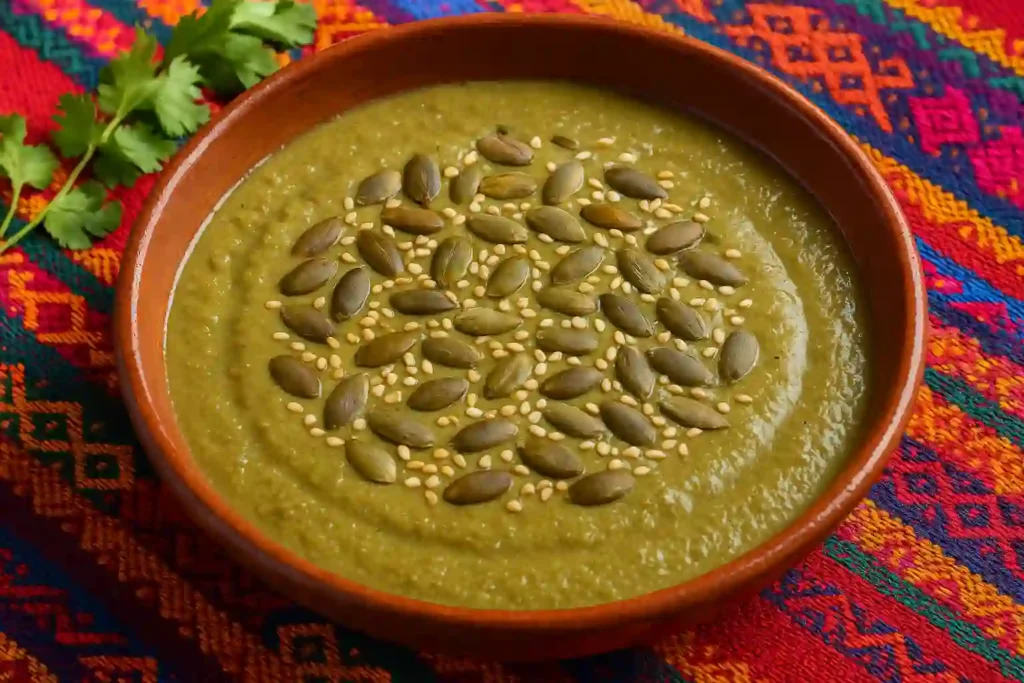
Table of Contents
Table of Contents
A Heartfelt Taste of Pipian Verde
A Family Memory Behind Pipian Verde
Pipian verde was more than a meal in my childhood home—it was a quiet celebration. I remember my abuela’s kitchen filling with the scent of toasted pumpkin seeds and roasted tomatillos. She’d always say, “pipian verde is how we say we love you without words.” Her voice still echoes in my head whenever I’m stirring a pot of it on my own stove.
That first taste of pipian verde is still fresh in my mind. Creamy, nutty, tangy, and just the right amount of heat. The green color shimmered with promise, and I was instantly hooked. It wasn’t just food—it was a moment, one I craved again and again.
She’d make her pipian verde with fresh herbs from the garden, sometimes adding a spoonful of pepitas right on top for extra crunch. We always had it with chicken, but sometimes she’d pour it over roasted squash or even a bowl of rice. And every time, it brought comfort.
I carry on the tradition now, serving pipian verde when I want my family to feel that same warmth. And every time it simmers, I’m reminded that good food doesn’t need to be complicated—it just needs to be real.
Just like a plate of zucchini fries shared on a busy weeknight or a bowl of pineapple cucumber salad on a warm afternoon, pipian verde is made for real life. It’s creamy, bold, and perfect for people who love flavor without fuss.
Print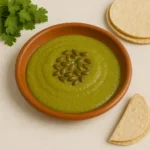
Pipian Verde Recipe: How to Make This Authentic Mexican Favorite
- Total Time: 30 minutes
- Yield: 4 servings
Description
Pipian verde is a creamy, nutty Mexican green sauce made with toasted pumpkin seeds, tomatillos, and fresh herbs. It’s perfect over chicken, pork, or vegetables for an authentic and comforting meal.
Ingredients
1 cup raw pumpkin seeds (pepitas), toasted
8 tomatillos, husked and rinsed
1/2 white onion, sliced
2 garlic cloves
1–2 jalapeños or serrano chilies (to taste)
1/2 cup cilantro or parsley
2 cups chicken or vegetable broth
1 tsp ground cumin
Salt to taste
Instructions
1. Toast pumpkin seeds in a dry pan until golden and fragrant.
2. Roast tomatillos and chilies until softened and slightly charred.
3. Blend roasted tomatillos, chilies, onion, garlic, herbs, toasted seeds, cumin, salt, and broth until smooth.
4. Pour mixture into a saucepan and simmer for 10–15 minutes, stirring occasionally.
5. Serve warm over chicken, pork, or vegetables with tortillas.
Notes
Store leftovers in an airtight container in the fridge for up to 5 days.
For extra spice, add an extra serrano.
You can use sunflower seeds as a nut-free alternative.
- Prep Time: 10 minutes
- Cook Time: 20 minutes
- Category: Sauce
- Method: Stovetop
- Cuisine: Mexican
Nutrition
- Serving Size: 1/2 cup
- Calories: 180
- Sugar: 2g
- Sodium: 300mg
- Fat: 15g
- Saturated Fat: 2g
- Unsaturated Fat: 11g
- Trans Fat: 0g
- Carbohydrates: 9g
- Fiber: 3g
- Protein: 5g
- Cholesterol: 0mg
Why Mexican Pumpkin Seed Sauce Is a Beloved Kitchen Staple
vibrant green herbs. It’s rich yet refreshing, thickened naturally with toasted seeds instead of flour or cream. The result is a creamy, nutty blend that feels both hearty and bright.
What really sets this green mole apart is its versatility. It pairs beautifully with grilled chicken, roasted pork, or layered in enchiladas. You can keep it thick for dipping or thin it slightly to use as a simmer sauce—either way, it delivers bold, green flavor that stands out.
This sauce is also surprisingly simple to prepare using common pantry staples and fresh produce. It’s the kind of dish you’ll see on family dinner tables and at festive gatherings, right alongside a slice of Mexican chocolate cake or a bowl of classic chips and salsa. A beloved staple in many home kitchens, this green sauce holds its place with pride.
How to Make Pipian Verde at Home
Key Ingredients That Bring Pipian Verde to Life
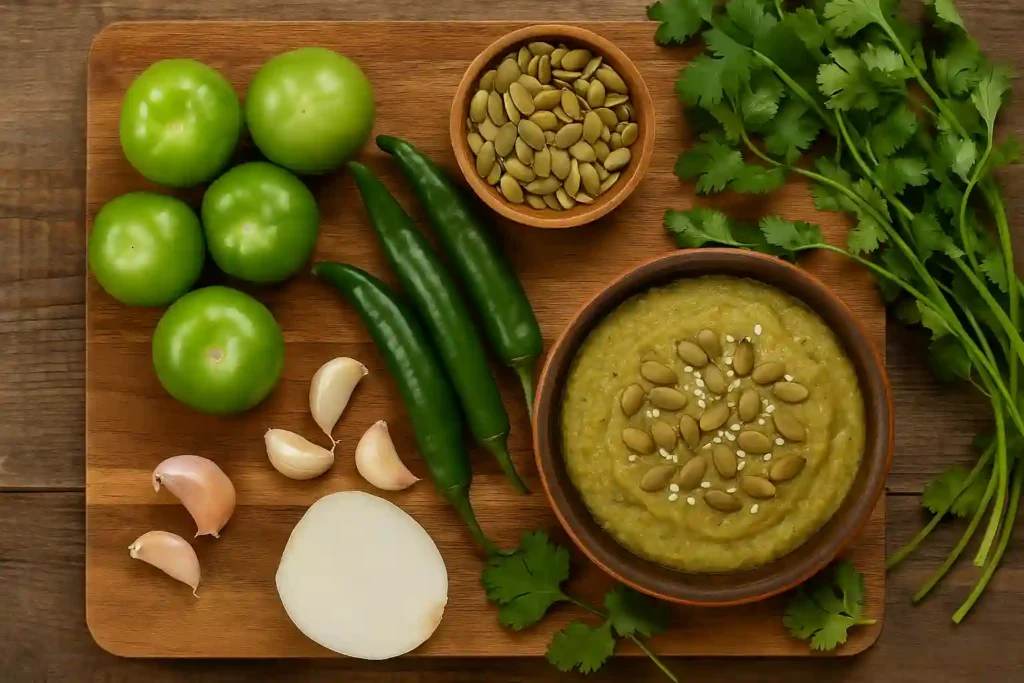
To make traditional pipian verde, you don’t need anything fancy—just fresh ingredients and a little time. At its core, pipian verde relies on toasted pumpkin seeds (pepitas) for creaminess, tomatillos for tang, and a blend of herbs and chilies for flavor and color.
Here’s what you’ll need:
- 1 cup raw pumpkin seeds (pepitas) – toasted for richness
- 8 tomatillos, husked and rinsed – brings that signature tart green flavor
- 2 garlic cloves – for warmth
- 1/2 white onion – sliced and lightly sautéed
- 1–2 jalapeños or serrano chilies – adjust to your heat preference
- 1/2 cup chopped cilantro or parsley – adds fresh depth
- 2 cups chicken or vegetable broth – to blend everything smoothly
- 1 tsp cumin + salt to taste
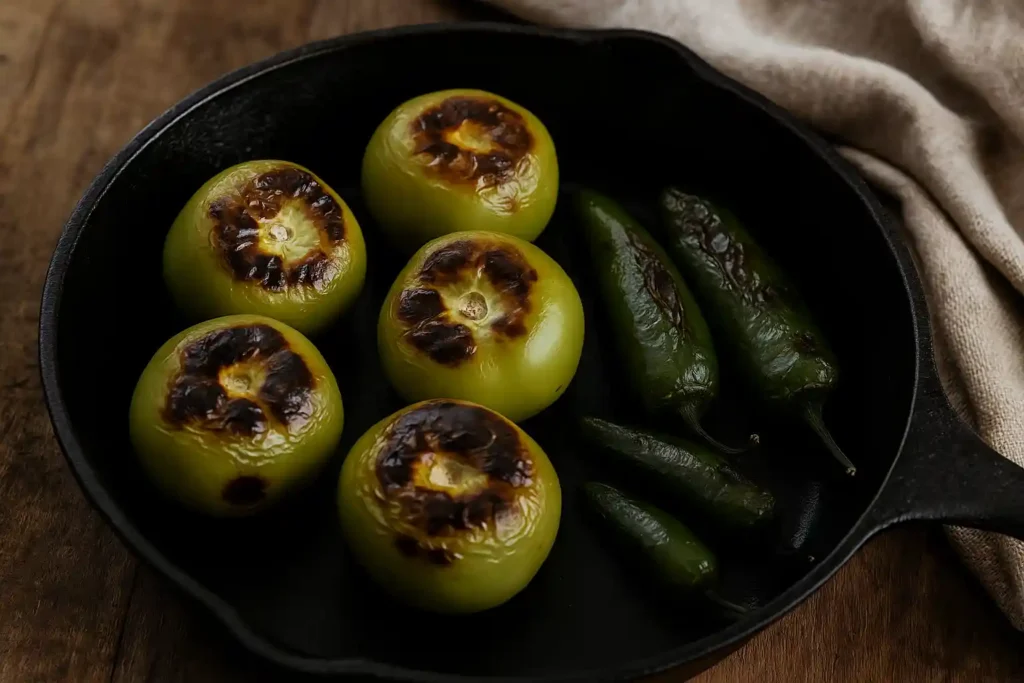
After roasting the tomatillos and chilies until charred and soft, everything gets blended until smooth and simmered gently. The result? A luscious green sauce with earthy, toasty, and tangy notes that coat anything you pour it on. For a visual pairing idea, think about serving pipian verde with air fryer buffalo wings or next to a bold side like keto Japanese BBQ sauce.
Pipian verde is naturally dairy-free and gluten-free, making it a great option for many diets while still delivering bold, comforting flavor.
Pipian Verde vs. Traditional Mole: What’s the Difference?
It’s easy to confuse pipian verde with mole since both are traditional Mexican sauces with deep roots. But while mole often includes ingredients like chocolate, dried chilies, nuts, and spices, pipian verde is lighter, greener, and centered around pumpkin seeds.
Let’s break it down:
| Feature | Pipian Verde | Traditional Mole |
|---|---|---|
| Main Ingredients | Pumpkin seeds, tomatillos, green chilies | Dried chilies, chocolate, nuts, spices |
| Color | Green | Brown to deep red |
| Texture | Creamy and lighter | Thick and complex |
| Flavor Notes | Fresh, tangy, nutty | Deep, sweet, spicy |
| Typical Use | Everyday dishes, quick meals | Special occasions, holiday meals |
| Prep Time | Faster—about 30 minutes | Longer—sometimes hours to prepare |
Pipian verde is often seen as simpler and more adaptable for everyday meals, while mole is richer and sometimes reserved for special occasions. Still, both celebrate the bold and diverse flavors of Mexican cuisine.
Serving Pipian Verde & Easy Variations
Delicious Ways to Serve Pipian Verde
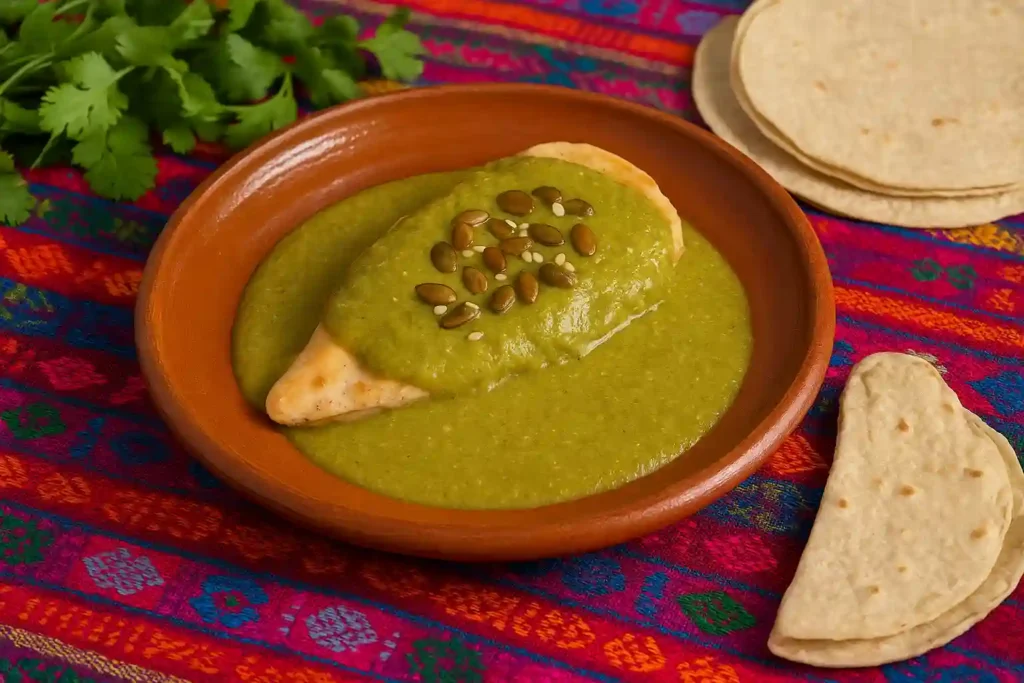
One of the best things about pipian verde is how effortlessly it fits into your everyday meals. It’s more than just a sauce—it’s a full-flavored companion to so many ingredients. Traditionally, pipian verde is served over poached chicken, pork loin, or grilled vegetables, often with warm tortillas and rice on the side.
But here’s the fun part: you can use pipian verde however you want.
Try it as:
- A base for enchiladas instead of red sauce
- A dip for roasted vegetables or tortilla chips
- A simmer sauce for tofu or tempeh in plant-based dishes
- A topping for grain bowls or shredded chicken tacos
- A bold drizzle on eggs or breakfast potatoes
Pipian verde even pairs surprisingly well with fried or grilled fish. Imagine spooning it over something like walleye fish tacos or alongside creamy flan to complete a flavor-packed meal. You can even use it to dress a roasted squash salad or as a dipping sauce for empanadas.
No matter how you serve it, pipian verde adds richness, depth, and just the right amount of brightness.
Easy Variations Based on What You Have
Don’t have every single ingredient listed in the classic recipe? No problem—pipian verde is super adaptable. Here are a few ways you can change it up without losing its spirit:
- Swap tomatillos with green tomatoes if tomatillos aren’t in season
- Use spinach, kale, or romaine in place of herbs like cilantro or lettuce
- Try sunflower seeds or cashews if you don’t have pumpkin seeds
- Add avocado for extra creaminess
- Roast everything on a sheet pan before blending to deepen flavor
Want it spicier? Add a serrano or two. Milder? Stick to just one jalapeño and remove the seeds.
You can also thin the sauce with extra broth to use it as a marinade or keep it thick for hearty spoonfuls. Either way, pipian verde lets you adjust based on your mood, pantry, or the season.
Recipes like pipian verde aren’t just about following rules—they’re about tradition, creativity, and making something beautiful with what’s on hand. Whether you serve it next to a sweet dish like Mexican chocolate cake or pair it with weeknight staples, it always delivers.
FAQ
What is pipian verde?
This green sauce is a staple in Mexican cooking. It’s made from toasted pumpkin seeds, tomatillos, and fresh herbs. The flavor is rich and creamy with a bit of tang and heat—perfect over meats or vegetables. Unlike dairy-based sauces, its thickness comes naturally from the seeds, giving it a comforting yet bold character.
What is the difference between mole and pipian?
Both are classic sauces, but mole is known for its complex blend of spices, dried chilies, and even chocolate. It’s darker, richer, and often served on special occasions. Pipian, especially the green version, is brighter and simpler in both ingredients and preparation. It highlights fresh herbs, seeds, and tomatillos, creating a lighter texture and flavor.
What is pepita verde in English?
The term refers to shelled green pumpkin seeds. These are commonly used in Mexican cuisine, not just for texture but for flavor. They’re usually toasted and ground, forming the creamy base for many traditional sauces.
What is pipián in English?
Pipián refers to a family of seed-based sauces in Mexican cooking. While there’s no one-word English translation, it can be described as a thick sauce made from ground seeds—most often pumpkin or squash seeds—combined with herbs, spices, and sometimes chilies. It comes in different styles, such as red or green, depending on the ingredients used.
Conclusion: Why This Sauce Belongs in Your Recipe Collection
This dish is more than just a recipe—it’s a memory, a connection, and a flavor that keeps you coming back. Whether you drizzle it over chicken, pair it with vegetables, or scoop it up with warm tortillas, it fits right into everyday meals and special gatherings alike.
What makes it truly special is its versatility. You can customize the heat, swap ingredients based on the season, and still end up with something rich and satisfying. And best of all, it’s made from real ingredients that are easy to find.
So if you’re craving a flavorful, comforting sauce that’s both traditional and timeless—this is one worth making.


